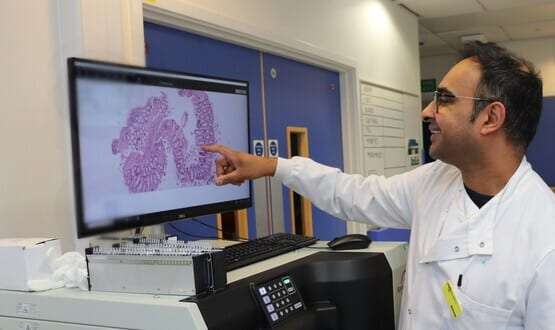Northern Care Alliance cuts referral times with Bleepa
- 24 October 2023

An independent review of Northern Care Alliance NHS Foundation Trust’s use of clinical communications platform Bleepa, has found a dramatic reduction in referral and clinical response times.
The review was able to identify a reduction of almost 75% in average referral times in comparison to paper-based systems, across three specialties using Bleepa at Northern Care Alliance to manage inpatient referrals.
The use of the technology was examined across Northern Care Alliance’s respiratory, cardiology and gastroenterology specialisms at Royal Oldham Hospital and Fairfield General Hospital.
Bleepa data of 10,000 patient referrals from July 2021 to April 2023 found that the average time from submission of a referral to first review was 0.55 days.
In comparison, before Bleepa was deployed the Greater Manchester trust was recording an average time lag of 2.1 days, representing a reduction of 1.55 days.
A range of financial benefits were also identified, showing savings at both trust and ICB level. With faster referrals, efficient clinical messaging and reduced length of stay for patients, the use of Bleepa could make a projected saving of £819,000 over five years, once the cost of deploying the technology has been taken into account.
Scaled up with economic modelling, it could free up £7.7m in the same time frame if it was adopted across the whole Greater Manchester ICB footprint.
Currently it is used within NCA for gastroenterology, palliative care, respiratory and cardiology referrals at the Royal Oldham hospital, and for gastroenterology at Fairfield General Hospital (Bury). Other specialties have been impressed by the system benefits for both patient care and staff user experience and plans are now in progress to onboard more specialities.
Commenting on the impact of Bleepa on clinical performance, Georges Ng Man Kwong, chest consultant and chief clinical information officer (Bury, Rochdale and Oldham) at Northern Care Alliance, said: “Access to the images with the referral has been really key. We worked with the Bleepa team to make sure we had a minimum data set for referral data. This was particularly important during the Covid pandemic.
“We’ve also found it good in terms of asynchronous working – we don’t necessarily have to traipse around the hospital with a list of patients to see referrals, we can manage them remotely. We’ve also then been able to message the team with clear instructions as to what’s been going on. The secure messaging has allowed us to progress patient care in a faster way.”
He also highlighted the importance of this evaluation: “I would also like to highlight the importance of systems evaluation and optimisation following go-live and implementation.
“Whilst we have been able to improve functionality in response to user feedback, this independent evaluation has been really helpful in providing robust evidence of system benefits in keeping with NHS digital principles,” Ng Man Kwong added.
The real-world evaluation was commissioned by Bleepa creators Feedback Medical to examine the impact that Bleepa could have at a hospital, trust and Integrated Care System level.
Feedback medical chief executive Dr Tom Oakley said: “We all know that helping the health and care system clear elective care backlogs is a top priority at the moment, so getting greater insight into how Bleepa speeds up referrals and improves clinical communication across key specialties is a great vote of confidence in the work our team does day in, day out to make the platform the most effective tool it can be for our clinical colleagues.”
Bleepa – a 2020/21 DigitalHealth.London Accelerator cohort – was previously piloted at Sussex Integrated Care System, alongside CareLocker.




